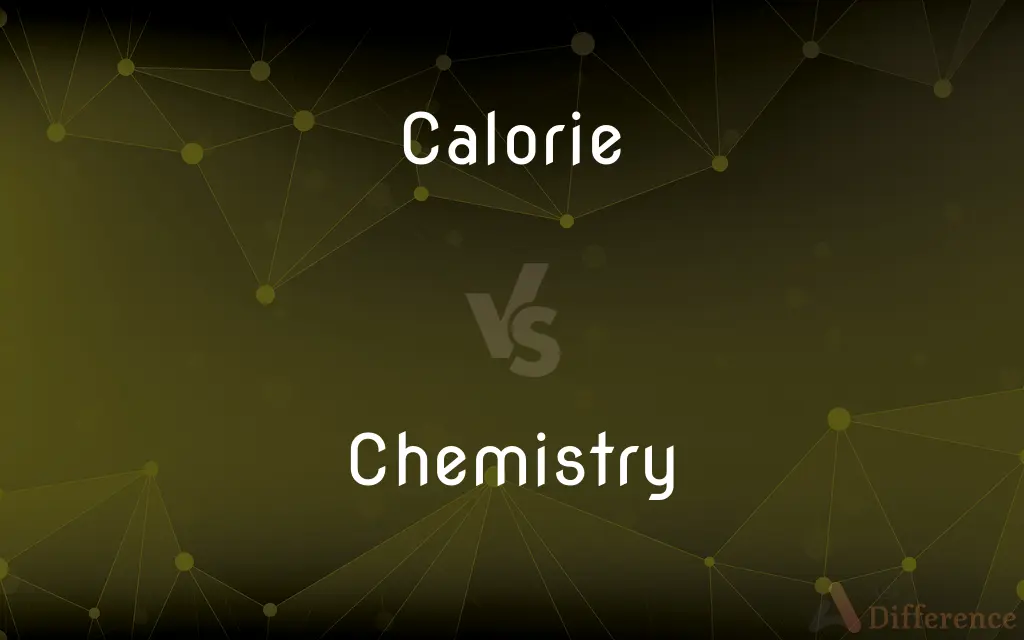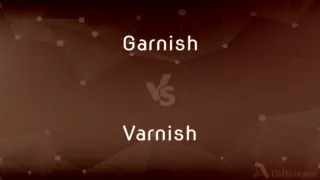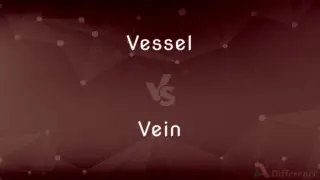Calorie vs. Chemistry — What's the Difference?

Difference Between Calorie and Chemistry
ADVERTISEMENT
Compare with Definitions
Calorie
The calorie is a unit of energy defined as the amount of heat needed to raise the temperature of a quantity of water by one degree. For historical reasons, two main definitions of calorie are in wide use.
Chemistry
Chemistry is the scientific study of the properties and behavior of matter. It is a natural science that covers the elements that make up matter to the compounds composed of atoms, molecules and ions: their composition, structure, properties, behavior and the changes they undergo during a reaction with other substances.In the scope of its subject, chemistry occupies an intermediate position between physics and biology.
Calorie
Abbr. cal Any of several approximately equal units of heat, each measured as the quantity of heat required to raise the temperature of 1 gram of water by 1°C at 1 atmosphere pressure. Also called gram calorie, small calorie.
Chemistry
The science of the composition, structure, properties, and reactions of matter, especially of atomic and molecular systems.
Calorie
Abbr. cal The unit of heat equal to 1/100 the quantity of heat required to raise the temperature of 1 gram of water from 0 to 100°C at 1 atmosphere pressure. Also called mean calorie.
ADVERTISEMENT
Chemistry
The composition, structure, properties, and reactions of a substance.
Calorie
Abbr. Cal The unit of heat equal to the amount of heat required to raise the temperature of 1 kilogram of water by 1°C at 1 atmosphere pressure. Also called kilocalorie, kilogram calorie, large calorie.
Chemistry
The elements of a complex entity and their dynamic interrelation
"Now that they had a leader, a restless chemistry possessed the group" (John Updike).
Calorie
A unit of energy-producing potential equal to this amount of heat that is contained in food and released upon oxidation by the body. Also called nutritionist's calorie.
Chemistry
Mutual attraction or sympathy; rapport
The chemistry was good between the partners.
Calorie
(nutrition) Kilogram calorie or large calorie. A unit of energy 1000 times larger than the gram calorie. It is equivalent to the gram kilocalorie, approximately 4.2 kilojoules.
Chemistry
(uncountable) The branch of natural science that deals with the composition and constitution of substances and the changes that they undergo as a consequence of alterations in the constitution of their molecules.
Calorie
The gram calorie or small calorie, a non-SI unit of energy, equivalent to approximately 4.2 joules. This unit was widely used in chemistry and physics, being the amount of energy needed to raise the temperature of 1 gram of water by 1 °C.
Chemistry
(countable) An application of chemical theory and method to a particular substance.
Calorie
The unit of heat according to the French standard; the amount of heat required to raise the temperature of one kilogram (sometimes, one gram) of water one degree centigrade, or from 0° to 1°. Compare the English standard unit, Foot pound.
Chemistry
The chemical properties and reactions of a particular organism, environment etc.
Calorie
Unit of heat defined as the quantity of heat required to raise the temperature of 1 gram of water by 1 degree centigrade at atmospheric pressure
Chemistry
(informal) The mutual attraction between two people; rapport.
Calorie
A unit of heat equal to the amount of heat required to raise the temperature of one kilogram of water by one degree at one atmosphere pressure; used by nutritionists to characterize the energy-producing potential in food
Chemistry
That branch of science which treats of the composition of substances, and of the changes which they undergo in consequence of alterations in the constitution of the molecules, which depend upon variations of the number, kind, or mode of arrangement, of the constituent atoms. These atoms are not assumed to be indivisible, but merely the finest grade of subdivision hitherto attained. Chemistry deals with the changes in the composition and constitution of molecules. See Atom, Molecule.
Chemistry
An application of chemical theory and method to the consideration of some particular subject; as, the chemistry of iron; the chemistry of indigo.
Chemistry
A treatise on chemistry.
Chemistry
The science of matter; the branch of the natural sciences dealing with the composition of substances and their properties and reactions
Chemistry
The way two individuals relate to each other;
Their chemistry was wrong from the beginning -- they hated each other
A mysterious alchemy brought them together
Share Your Discovery

Previous Comparison
Garnish vs. Varnish
Next Comparison
Vessel vs. Vein














































